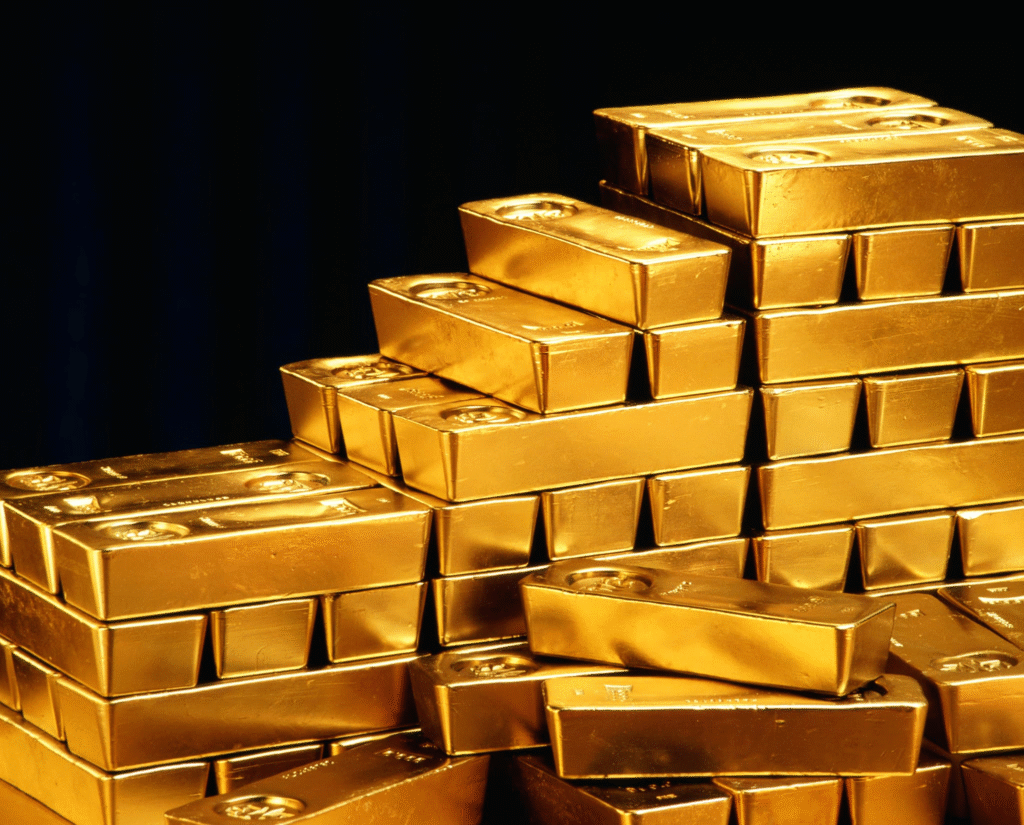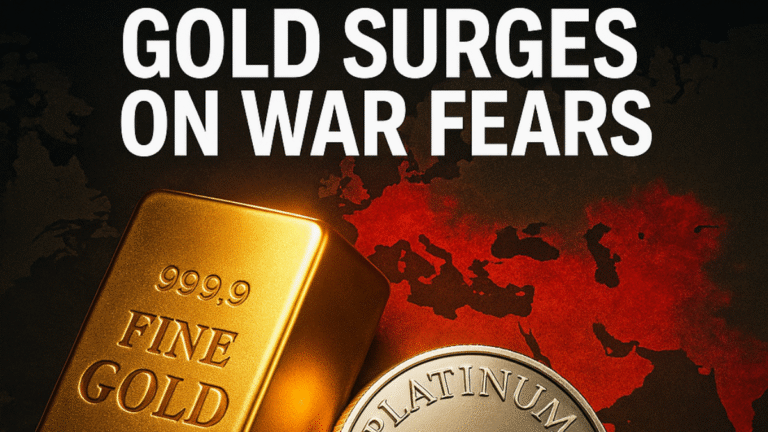By Sahil Kumar | Taaza Wire | June 13, 2025
Israel-Iran tensions gold price surge has taken global markets by storm, with bullion soaring to its highest level in nearly two months. Investors are rushing to the safety of gold amid rising geopolitical conflict in the Middle East, pushing both global and Indian gold prices sharply higher. The recent Israeli airstrikes on Iranian nuclear and military sites—and Tehran’s retaliatory drone attacks—have sent shockwaves through the financial world, turning gold into the top-performing asset of the week.

Amid escalating geopolitical chaos in the Middle East, gold prices soared to a near two-month high, driven by intense safe-haven demand. The market responded sharply to the renewed Israel-Iran tensions, with global bullion rates rising significantly on both COMEX and MCX platforms. As investors sought refuge from increasing global uncertainty, gold once again solidified its position as a time-tested hedge.
Israel-Iran Tensions Trigger Gold Rally
The spark behind this dramatic surge in gold prices is the escalating conflict between Israel and Iran. Israel carried out widescale airstrikes on Iranian nuclear facilities and military infrastructure, triggering massive retaliation from Tehran in the form of 100 drones launched toward Israeli territories. These developments have ignited fears of a prolonged regional conflict, prompting a massive rush to safe-haven assets like gold.
On the Multi Commodity Exchange (MCX), gold breached the psychological ₹100,000 per 10 grams mark, opening at ₹99,500 and hitting an intraday high of ₹100,403. This represents a steep gain of over ₹1,500 in a single session, making it one of the most significant intraday movements in recent months.
Global Gold Market Reacts Strongly
At the international level, spot gold jumped 1% to $3,417.59 an ounce, its highest since April 22. U.S. gold futures also surged, touching $3,438 per ounce, reflecting the bullish sentiment globally. Analysts anticipate that Israel-Iran tensions and safe-haven demand will likely keep prices elevated in the short term.
According to Carsten Menke, analyst at Julius Baer, “The attacks have clearly contributed to the bullish sentiment in the gold market. But whether this rally sustains depends on how the geopolitical situation evolves.”
MCX Gold Prices: Why Indian Buyers Are Worried
In India, the rally in gold prices due to Israel-Iran tensions is compounded by a weakening rupee. The Indian currency fell by 60 paise to ₹86.10 against the U.S. dollar, making imported gold even costlier. As a result, physical demand in the retail market has taken a hit, with many Indian consumers hesitating to buy at record-high prices.
Market expert Jateen Trivedi of LKP Securities notes, “Support for MCX gold is now seen at ₹98,000, while short-term resistance could extend to ₹1,02,500 if geopolitical risks worsen.”
Other Factors Fueling Gold’s Momentum
Aside from Israel-Iran tensions, several other macroeconomic factors are supporting the gold rally:
- U.S. inflation cools: The Consumer Price Index (CPI) increased by just 0.1% in May, boosting hopes for rate cuts by the U.S. Federal Reserve.
- Weaker U.S. dollar: The greenback has softened amid dovish Fed expectations, lifting gold priced in dollars.
- US-China trade risks: Renewed trade war fears due to President Trump’s tariff threats are also pushing investors toward safer assets.
Silver, Platinum Also Ride the Safe-Haven Wave
While gold leads the surge, other precious metals have also posted gains this week. Despite a 0.2% dip to $36.31 per ounce, silver remains on track for a weekly rise. Platinum dropped 1.6% to $1,274.50, and palladium eased 0.5% to $1,060.44, but both metals are still set for weekly gains.
Is Now a Good Time to Invest? Analysts Decode Israel-Iran Tensions Gold Price Spike?
With Israel-Iran tensions gold price dominating headlines, many investors are wondering if this is the right time to invest.
Historically, gold has delivered positive returns in 16 out of the past 20 years, making it a reliable hedge during global crises. Analysts predict that if the Middle East conflict intensifies further or oil supplies are disrupted, gold prices may even test the $3,540 level on COMEX in the short term.
NS Ramaswamy, Head of Commodities at Ventura Securities, says: “Gold’s safe-haven appeal remains intact. Support is seen at $3,400, and resistance is likely at $3,476. It remains a core asset for uncertain times.”
Conclusion
The Israel-Iran tensions gold price story is far from over. With geopolitical risks still high, and inflation data pointing toward potential interest rate cuts, gold is expected to remain in focus for investors globally. However, retail buyers, especially in India, may want to exercise caution as domestic prices surge past key resistance levels.
For those seeking safety amid chaos, gold once again proves why it’s known as the ‘crisis metal’—delivering both stability and long-term gains in uncertain times.
🔔 Stay tuned with Taaza Wire for more breaking updates on global markets and geopolitical developments.
FAQs
Q1. Why are gold prices rising due to Israel-Iran tensions?
The Israel-Iran conflict has sparked geopolitical fears, prompting investors to flock to gold as a safe-haven asset, causing prices to surge globally.
How high can gold prices go amid Israel-Iran tensions?
Analysts predict gold may hit $3,540 on COMEX and ₹1,02,500 on MCX if the conflict escalates or oil supply is disrupted.
Should I buy gold now amid Israel-Iran tensions gold price surge?
Experts advise cautious optimism. Gold has historically performed well in crises, but buyers should consider short-term volatility.
What is the impact of Israel-Iran tensions gold price on the Indian market?
The Indian market saw MCX gold breach ₹100,000 due to global rally and rupee weakness, making physical gold more expensive.
How does a weakening rupee affect the Israel-Iran tensions gold price in India?
A weaker rupee increases import costs, pushing domestic gold prices even higher during international market surges.




[…] Gold Prices Surge to 2-Month High as Israel-Iran Tensions Ignite Safe-Haven Demand […]